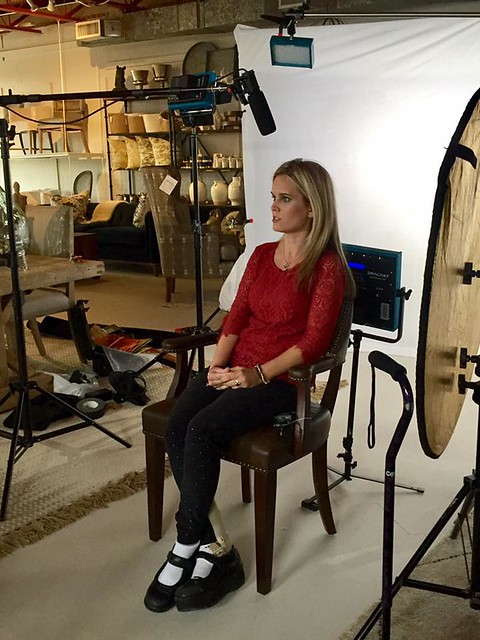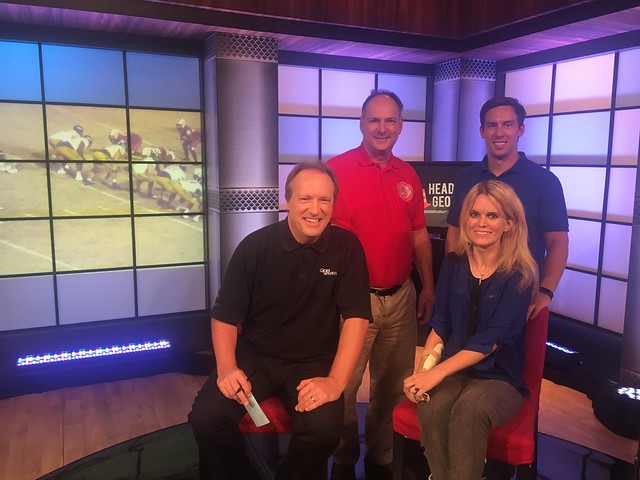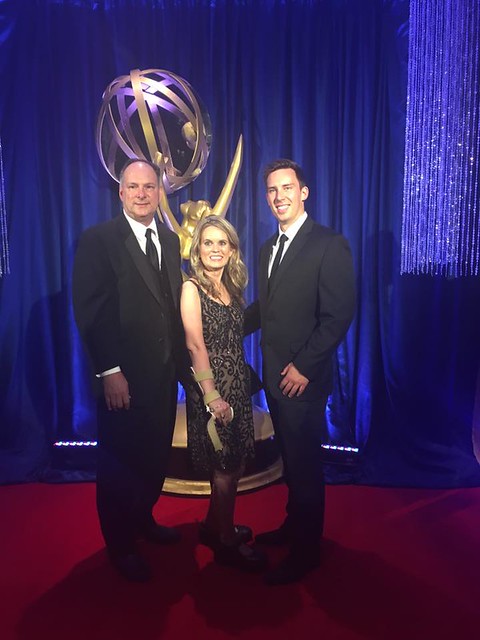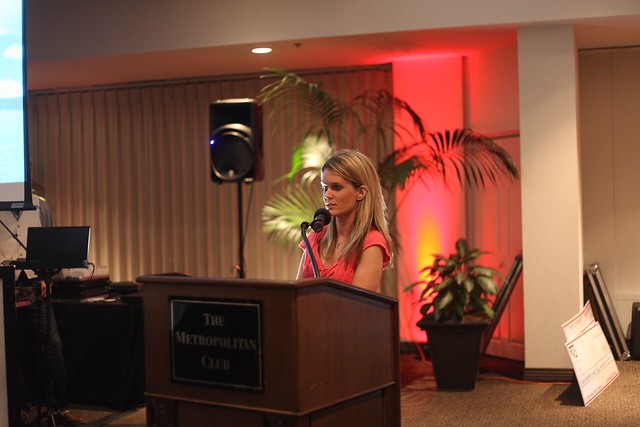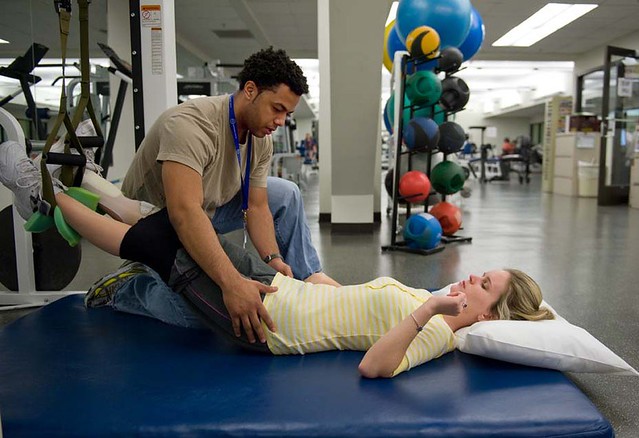Auburn alumna using her first-hand experience to prevent distracted driving
Article body
Molly Welch ’11 is using her story to educate drivers about the dangers of turning away their attention from the road, even for a second.
On Feb. 9, 2008, Welch was driving back to Auburn on I-85 from her home in Alpharetta, Georgia. She was a junior and a writer for The Plainsman, Auburn’s student newspaper. In hopes of making use of the hour and a half in the car, she reached down to search for her tape recorder to start talking through a story to write.
The tape recorder captured it all: the country song on the radio, the force of impact with a pick-up truck, the sound of shattered glass, a voice telling Welch help was on the way and sirens approaching.
A large crowd, including her family, friends and members of the Auburn community, gathered for several nights at the East Alabama Medical Center in Opelika, waiting for answers. Welch remained in a coma in the critical care unit before she was transferred to the Shepherd Center, a rehabilitation hospital, in Atlanta, to be treated for her severe traumatic brain injury.
The Shepherd Center, after doing all they could, sent Welch home with a possibility of emerging from the coma. It was not until her father came to her room to stretch Molly’s stiff arm that she emerged and was able to begin mouthing words to communicate.
The damaged left side of her brain impaired the entire right side of her body, paralyzing her right arm and stiffening her left leg. She suffered memory loss of the months leading up to the accident.
The young woman who, just months before, was active on campus and was studying to work in the journalism field, now had to re-learn how to move, walk, talk and write on her non-dominant side.
She spent months back at the Shepherd Center as an inpatient receiving numerous surgeries and working in occupational, speech and physical therapy. She was an outpatient for seven additional years, all the while keeping in contact with her connections at Auburn.
John Carvalho, a professor in the School of Communication and Journalism, said that the faculty would get updates from Welch and her mom and visited her in the hospital and in their home when passing through Atlanta.
"We kept in touch with her to let her know we weren’t going to leave her behind,” Carvalho said.
Faculty members arranged a two-night fundraiser at Auburn’s Brick Oven Pizza Company where Welch worked prior to the accident. Carvalho said that it was "just our way of doing what we can to help.”
As her recovery progressed, Welch found a new determination to reach her goal of graduating from Auburn. With the help of the journalism department, she arranged a schedule with online classes and traditional classes one day a week in order to be able to continue therapy while going to school.
"I started at Auburn and just had to finish there,” Welch said. "Auburn is a phenomenal place.”
Welch faced a world of challenges in returning to Auburn. She had a two-and-a -half-hour commute to Auburn and couldn’t drive, so her family members would take her and help her walk across campus to all her classes. She insisted on parking in the parking deck and walking down the concourse like the other students.
"It took her a long time, but she would do it,” said Carvalho. "That just struck me as a kind of visual representation of the determination she was applying to this.”
Welch said that she faced new challenges in her second round as a student. "Besides the difficulty with getting there, I had a lot more difficulty focusing, reading and asking questions.”
Judy Sheppard, a retired journalism professor who taught Welch after the accident, described Molly as "remarkable.”
Sheppard saw firsthand how Welch connected with stories they read in class, especially stories about people overcoming difficulties or insecurities.
"She zoomed in on that story and several others, and I saw this flicker of real understanding,” said Sheppard. "Molly has this disability to overcome, but in reality she’s someone who’s done such a wonderful job in overcoming that.”
Welch completed her classes and, with the help of her brother, who graduated from Auburn the same day, walked across the stage to receive her diploma at graduation in 2011.
"Words can’t describe how I felt,” Welch said. "I’m just elated.”
"She walked across that stage and shook Dr. Gogue’s hand, just three years after the accident,” Sheppard said. "I sat up in the bleachers at graduation by myself and just cried.”
After graduation, Welch returned to the Shepherd Center to work in communications and assist patients who suffered from similar conditions. She worked with younger patients to encourage them and became a real-life example that recovery was possible for them too.
"I see tons of people at Shepherd,” she said. "It makes me feel so sad to realize that some may be hurt much worse than me.”
The idea to use her story to help even more people came to Welch during her second year working at the Shepherd Center and through a chance encounter at a Starbucks.
Rick Perkins is the owner of an Alpharetta-based technology solutions company, NuTEQ Solutions, which developed a customer service via text messaging program. Perkins approached Welch in a Starbucks as she was working on her computer and the two discussed the connection between text messages and distracted driving. They decided to partner on a public service announcement to be aired on NuTEQ Solutions’ clients local cable channels.
The PSA runs in Maryland, Texas and South Dakota, with more markets expected soon. Welch starred in the Emmy-nominated PSA, which served as a catalyst for her to use her journalism degree and her passion to prevent accidents like her own. Her campaign, A Second Later, was born.
Welch works as a motivational speaker and is focusing her efforts on reaching teen drivers, who comprise the majority of distracted driving accidents. Welch visits schools, churches and group meetings to spread her message and tell her story.
"When people choose to ignore the dangers of distracted driving, I want them to envision my face,” Welch said. "I want them to know the real outcomes of their distracted driving.”
On Oct. 30 she will speak to Georgia legislators about her story and strengthening the law to eliminate distracted driving. Several news outlets, including Fox 5 Atlanta, Georgia Public Broadcasting, 11 Alive and CBS46, have featured Welch’s story and campaign.
Welch is also participating in a ghost-out with high school students, which is a mock fatal crash scene exercise to demonstrate the potential consequences of distracted driving.
"All I need is just to save one life,” Welch said.
Welch’s professors from Auburn still keep up with her as she turns her tragedy into a message inspiring others.
"Here she is, this beautiful young woman, and she’s had this thing happen to her and it could happen to anyone else,” Sheppard said. "For young people, just wait a second to get off the road to talk to somebody, which could be your moment when you continue to live your life or you come to live mine. She’s just got that glow about her; I think it makes her presence in a PSA so good.”
As for the future, the sky’s the limit for Welch. "I have so many hopes and dreams, I don’t know where to start.”
"I know it’s a cautionary tale, but I think beyond that, she provides an inspiring follow up to that,” Carvalho said. "It’s more than just ‘I don’t ever want to drive distracted, I’ve got to put the phone away.’ I hope they also pick up that you can do a little more than you’re doing based on your perceived limitations. You’ll never be perfect, but it can be better than you thought it would be.”
Welch is focused on sharing her story and stimulating conversation about the dangers of distracted driving widely, she said. To learn more about A Second Later, visit the Facebook and Twitter pages, @asecondlater. To host a speaking event or conversation about distracted driving, contact Welch by email.
Related Media
Media interested in this story can contact Communications Director Preston Sparks at (334) 844-9999 or preston.sparks@auburn.edu.
Auburn University is a nationally ranked land grant institution recognized for its commitment to world-class scholarship, interdisciplinary research with an elite, top-tier Carnegie R1 classification, life-changing outreach with Carnegie’s Community Engagement designation and an undergraduate education experience second to none. Auburn is home to more than 30,000 students, and its faculty and research partners collaborate to develop and deliver meaningful scholarship, science and technology-based advancements that meet pressing regional, national and global needs. Auburn’s commitment to active student engagement, professional success and public/private partnership drives a growing reputation for outreach and extension that delivers broad economic, health and societal impact.



